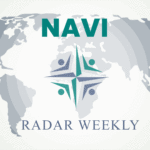Subscribe to NAVI Radar Weekly
Visit NAVI Research Institute
Focus Point: Regional Security- Transatlantic Security/NATO
Chair of the NATO Military Committee visits Ukraine | NATO
By NATO |10.02.2025
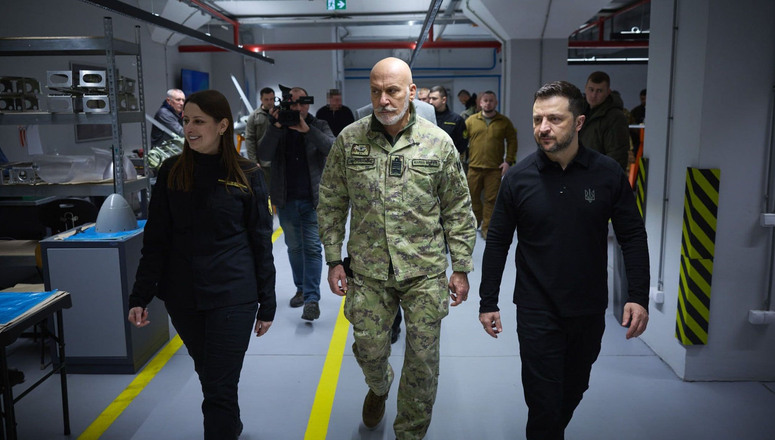
Source: NATO
On 07 and 08 February 2025, the Chair of the NATO Military Committee Admiral Cavo Dragone paid a visit to Ukraine. This is the first official foreign visit undertaken in the Chair’s new position. This visit underscores the NATO Military Authorities’ unfettered support to Ukraine. Read more…
Admiral Cavo Dragone underscored: “It is in the political and military interest of the Alliance to support Ukraine, not only now, but also in the future. You are fighting not only for your nation. You are fighting for your identity. NATO stands with you. Our support for your sovereignty and territorial integrity will remain unwavering;” “together, we can put Ukraine in the strongest possible position moving forward.”
The Chair also noted the creation of the NATO Security Assistance and Training for Ukraine (NSATU) command in Wiesbaden, Germany and the establishment of the NATO-Ukraine Joint Analysis, Training and Education Center (JATEC) in Bydgoszcz, Poland, which aims to jointly identify and incorporate the lessons learned from Russia’s brutal war of aggression.Read more…
Focus Point: Emerging Technologies & Data- Cyber Security
AI Publications|Kai Zenner LinkedIn
By Kai Zenner LinkedIn | Accessed 11.02.2025
In case you still do not have enough from hashtag#AI, I have three new hashtag#publications for you.
▪️ In early February, Nomos Verlagsgesellschaft will publish the first issue of hashtag#EuDIR (Zeitschrift für Europäisches Daten- und Informationsrecht), a new bimonthly scientific journal with me as one of the permanent editors. In the future, I will write the ‘Brussels Inside’ column for EuDIR, looking in particular into secondary legislation & guidelines. However, for the 1st issue Prof. Dr. Rolf Schwartmann and I wrote an article about the AI Act’s handling of hashtag#GPAI hashtag#systems. Among other questions, we are discussing responsibilities along the AI value chain as well as substantial modifications. Many thanks to Rolf and Kristin Benedikt for involving me! Order the journal here: https://lnkd.in/eWPws_iZ
▪️ In mid-January, the hashtag#English version of our hashtag#AIAct handbook was finally released in print and as eBook by C.F. Müller GmbH. It took us three months longer as originally planned (translating 300 legal pages from German to English is not the easiest task) … but now we are all very satisfied with the final result. If you look for a comprehensive summary of this complex law that is at the same time illustrating its relationship with other digital laws, check out our handbook. Many thanks to my co-publishers Prof. Dr. Rolf Schwartmann and Tobias Keber as well as all of our excellent authors. Order the handbook here: https://lnkd.in/eCSWkEpC
▪️ On 1 December, the ‘Zeitschrift für Product Compliance’ (ZfPC) published by Nomos Verlagsgesellschaft released Vol. 6/2025 that featured my piece on ‘The AI Liability Directive: the missing piece in the EU AI strategy’. Read more…
Focus Point: Regional Security- Transatlantic Security/NATO
NATO Defence Ministers conclude meeting, focus on defence spending and support for Ukraine | NATO
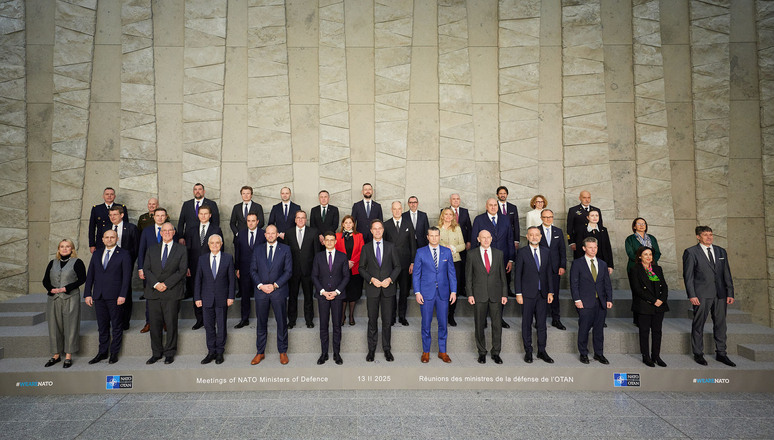
Source: NATO
By NATO | 13.02.2025
Defence Ministers from NATO nations concluded their meeting in Brussels today (13 February 2025), setting the stage for the upcoming NATO Summit in The Hague in June. NATO Secretary General Mark Rutte expressed his shock and sadness at what appears to have been a deliberate attack in Munich, where many people were injured.
Ministers discussed progress bolstering NATO’s deterrence and defence and the robust defence plans to which all Allies have agreed. ” To ensure we are fully ready to execute these plans we need more military capabilities, and for that we need significantly more defence spending,” Mr Rutte emphasized. “It is clear from our discussions today that Allies recognise the need to invest much more,” he added.
Defence ministers also discussed enhancing the defence industrial base on both sides of the Atlantic, recognising the need for a wartime mindset to ensure credible deterrence and defence in the face of growing security challenges.
In the NATO-Ukraine Council session with Ukrainian Defence Minister Rustem Umerov, Allies discussed the importance of continued support to Ukraine, “which is crucial so that this brutal war of aggression can come to a just and lasting end.” Read more…
Focus Point: Security and Defense Policy- Defense Discussions
Secretary General in Munich: Europe needs to step up | NATO
By NATO | 14.02.2025
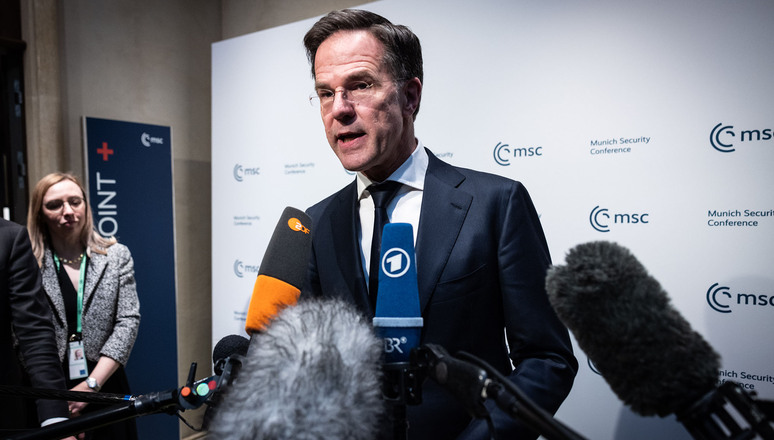
Source: NATO
Secretary General Mark Rutte attended the Munich Security Conference (MSC) on Friday and Saturday (14-15 February 2025). He stressed the need for a strong NATO, urging European Allies to increase their defence spending and take on more responsibility while calling for industry on both sides of the Atlantic to ramp up defence production.
The Secretary General underlined that any peace for Ukraine must be durable and include security guarantees, so that Putin will never again try to capture one square mile of Ukraine. Mr Rutte urged European leaders to propose concrete ways in which they could help make sure that peace, once agreed, would be lasting. Read more…
Focus Point: Security and Defense Policy- Emerging Threats and Global Risks
Global Foresight 2025-Welcome to 2035 What the world could look like in ten years, according to more than 350 experts. | The Atlantic Council
By Mary Kate Aylward, Peter Engelke, Uri Friedman, and Paul Kielstra| 12.02.2025
In this year’s Global Foresight edition, our experts share findings from our survey of global strategists on how the next decade could unfold. Our team of next-generation scholars spot “snow leopards” that could have major unexpected impacts in 2025 and beyond. And our foresight practitioners imagine three different scenarios for the next decade.
Another devastating world war, potentially bringing China and the United States into direct conflict. The spread and even the use of nuclear weapons. The wars in Ukraine and Gaza failing to ultimately produce favorable outcomes for Kyiv and Israeli-Palestinian peace. A more multipolar world without robust multilateral institutions. A democratic recession further devolving into a democratic depression.
These are just some of the future scenarios that global strategists and foresight practitioners pointed to when the Atlantic Council’s Scowcroft Center for Strategy and Security surveyed them, in late November and early December 2024 following the US elections, for its third-annual survey on how they expect the world to change over the next ten years.
Not all the projections were pessimistic. Fifty-eight percent of those who participated in our Global Foresight 2025 survey, for example, felt that artificial intelligence would, on balance, have a positive impact on global affairs over the next ten years—an increase of 7 percentage points from our Global Foresight 2024 survey. Roughly half of respondents foresaw an expansion of global cooperation on climate change.
But the grimmer forecasts were in keeping with a dark global outlook overall, with 62 percent of respondents expecting the world a decade from now to be worse off than it is today, and only 38 percent predicting that it will be better off.
The 357 survey respondents were mostly citizens of the United States (just under 55 percent of those polled), with the others spread across sixty countries and every continent but Antarctica. Respondents skewed male and older, and were dispersed across a range of fields including the private sector, nonprofits, academic or educational organizations, and government and multilateral institutions.
So what do these forecasters of the global future anticipate over the coming decade? Below are the survey’s ten biggest findings.
- Forty percent of respondents expect a world war in the next decade—one that could go nuclear and extend to space.
- Tensions with China and Russia are potential vectors for major conflict.
- Just under half of respondents expect China, Russia, Iran, and North Korea to be formal allies within a decade, potentially in a world featuring China- and US-aligned blocs
- The proliferation and use of nuclear weapons is a growing risk, with nearly half of respondents expecting a nuclear weapon to be used by 2035
- The United States is still likely to be dominant militarily in 2035—but with relatively less economic, diplomatic, and soft power as it navigates a multipolar world
- Many respondents are pessimistic about the war in Ukraine ending on terms favorable to Ukraine
- Respondents are much more optimistic about a breakthrough in Israeli-Saudi relations than in Israeli-Palestinian peace
- As global organizations become less capable of solving the world’s problems, regional groupings and the BRICS may rise in importance
- Today’s democratic recession may deepen into a democratic depression
- Women are more pessimistic about the global future than men are
This survey was conducted from November 15, 2024 through December 2, 2024. Read more…
Focus Point: Security and Defense Policy- Russia-Ukraine War
Starmer to join Macron-led European crisis summit on Trump’s Ukraine plan | The Guardian
By Patrick Wintour and Toby Helm| 15.02.2025
French president calls for urgent talks in Paris amid fears US leader is sidelining allies.”
The French president, Emmanuel Macron, was on Saturday night seeking to convene an emergency meeting of European leaders, including the UK prime minister, Keir Starmer, as concerns grew over Donald Trump’s attempts to seize control of the Ukraine peace process.
Speaking at the Munich security conference, Poland’s foreign minister, Radosław Sikorski, said he was “very glad that President Macron has called our leaders to Paris” to discuss “in a very serious fashion” the challenges posed by Trump.
“President Trump has a method of operating which the Russians call razvedka boyem – reconnaissance through battle: you push and you see what happens, and then you change your position … and we need to respond,” the Polish minister said.
The meeting, likely to be held on Monday, is expected to discuss US efforts to exclude European leaders from the peace talks, the position Europe should adopt on Ukraine’s future membership of Nato and how Ukraine can be offered security guarantees, either through NATO or some European force. Read more…
Focus Point: Security and Defense Policy- Russia-Ukraine War
Nato at odds with Ukraine over Soviet-style tactics | The Telegraph
Daniel Hardaker | 16.02.2025
Nato is at odds with Ukraine over its battlefield tactics, with British defence sources accusing Volodymyr Zelensky’s army of wasting expensive weapons and equipment, The Sunday Telegraph can reveal.
Kyiv’s troops are understood to be combining Western-donated weapons with Soviet-style tactics, in a misstep which has led to a significant amount of squandered Nato weaponry.
Sources said there had never been enough time to teach Ukrainians advanced Nato tactics, comparing the training given in the UK and Ukraine to the condensed courses undertaken by British reservists, which squeeze months of training into two-week packages.
In 2023, a leaked German army document stated that Ukrainian forces were ignoring lessons learnt during Western training, negating the advantages of Nato weapons and tactics.
It said Ukraine was breaking up Nato-style formations into smaller units and not adapting to Western manoeuvre warfare, blaming a Ukrainian “operational doctrine” that was entrenched in its officer corps.
The Ministry of Defence said that UK support for Ukraine was “ironclad” and emphasised that it had provided more than 52,000 Ukrainian recruits with “vital battlefield skills to take back to the frontline”.
It added: “The training mission is intelligence-led and evolves as required, in line with the Ukrainian General Staff’s direction.”
The Ukrainian military has been contacted for comment. Nato declined to comment. Read more…
Thank you very much for reading.
The NAVI Research Institute is the research division of NATO Veterans Initiative - NAVI that provides a unique perspective to transatlantic leaders and societies on peace and security through the lens of NATO's founding principles of rule of law, democracy, human rights, and individual liberties. The NAVI Research Institute was officially established by the NAVI Board on July 16th, 2023.
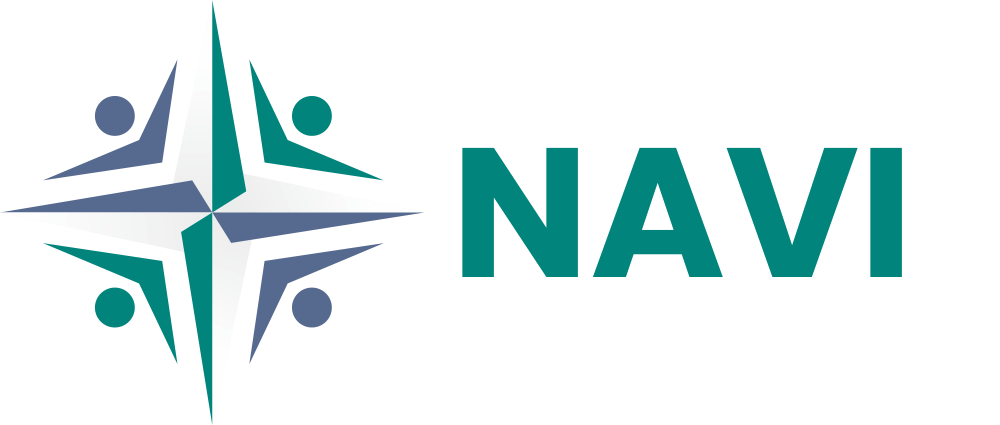
![NAVI-PROJE-[Recovered] Radar Weekly](https://nato-veterans.org/wp-content/uploads/2024/05/NAVI-PROJE-Recovered-696x392.gif)
